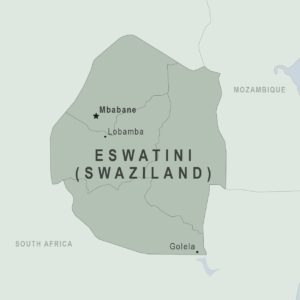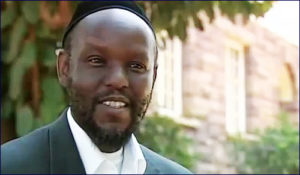 In 2019 there was an estimated Jewish community of about 50 to 60 people in Mbabane. Despite their small numbers, Swazi Jews have played an important role in the growth and development of the country, particularly in the business and legal communities. The community consists of Israelis, South African Jews, and descendants of World War II refugees. Some Holocaust survivors also settled in Swaziland.
In 2019 there was an estimated Jewish community of about 50 to 60 people in Mbabane. Despite their small numbers, Swazi Jews have played an important role in the growth and development of the country, particularly in the business and legal communities. The community consists of Israelis, South African Jews, and descendants of World War II refugees. Some Holocaust survivors also settled in Swaziland.
The Jewish presence dates back to the Second World War when Holocaust survivors who were turned away by South Africa came to settle in Swaziland. Kalman Goldblatt, from Lithuania, was heavily involved in the economic development of the country, and helped establish the first townships in the country. He also owned a number of exotic cars, including a white Cadillac that had belonged to Elvis Presley.
The Jewish community in Swaziland has experienced very little anti-Semitism and is active in the country’s business and legal communities. Many of the Jewish immigrants of the post-war era intermarried with the indigenous population and, as a result, many Swazis today have Jewish surnames – including a former Cabinet minister.
The head of the Jewish community in Swaziland, the last of Africa’s kingdoms, is a black South African who practices as a Jew. Geoff Ramokgadi is fully versed in the rituals and tradition of the religion. He sports a kipah, speaks Hebrew and sprinkles his conversation liberally with Yiddish expressions.
 Natan Gamedze, a member of the royal line and grandson of the King of Swaziland, converted to Judaism in 1991 and is currently an Orthodox rabbi. He also is fluent in 13 languages. More recently, Jewish citizen Stanley Sapire served as the Chief Justice of the Swazi Court of Appeal.
Natan Gamedze, a member of the royal line and grandson of the King of Swaziland, converted to Judaism in 1991 and is currently an Orthodox rabbi. He also is fluent in 13 languages. More recently, Jewish citizen Stanley Sapire served as the Chief Justice of the Swazi Court of Appeal.
Due to the small size of the Swazi Jewish community, there is no synagogue. Kosher food in Swaziland is extremely scarce, and non-existent outside of Mbabane.
In 2017, deputy ambassador to South Africa Ayellet Black led a course on drip irrigation and crop management in Swaziland with two Israeli experts, Shlomo Kramer and Nissim Sroussi. This comes after a severe drought, caused by the effects of El Nino, almost crippled Swaziland and left hundreds of thousands without food, endangering the country’s food security.